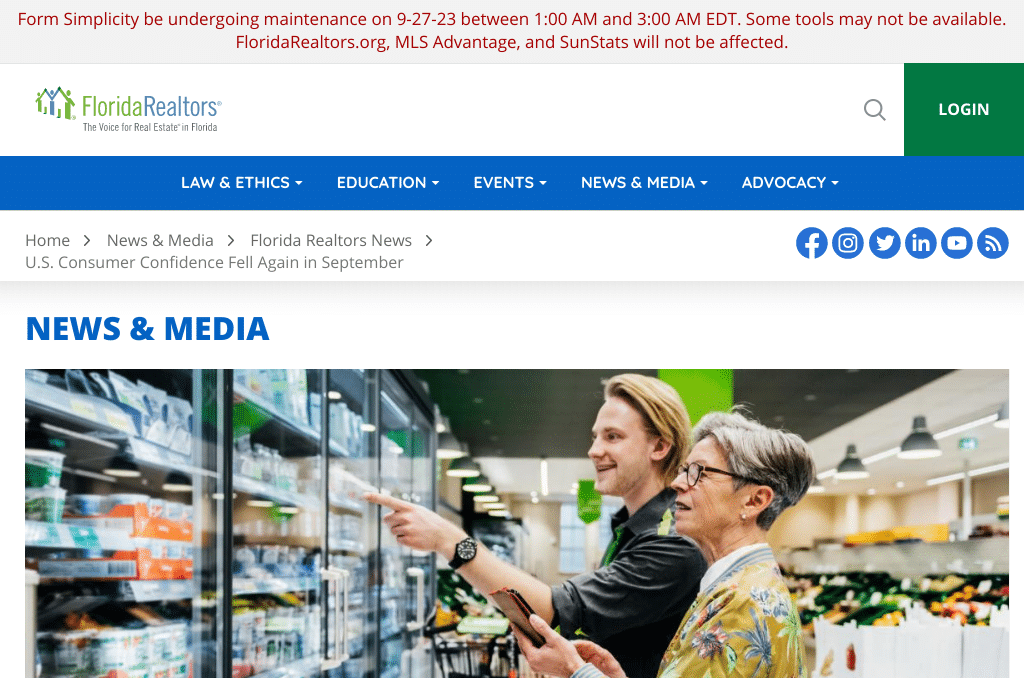Consumer Confidence Takes a Dive in September: Implications for the Economy
Consumer confidence and expectations experienced a significant decline in September, according to the latest report from the Conference Board. The Consumer Confidence Index dropped to 103.0 from a revised 108.7 reported in August, and the Expectation Index fell nearly 10 points from 83.3 to 73.7, well below the 80-mark used to indicate an oncoming recession.
The drop in consumer confidence can be attributed to several factors, including inflation, high interest rates for loans, the possibility of a recession, and an impending government shutdown. These factors have dampened the six-month outlook for the economy, leading to a decrease in consumer confidence.
The sharp decline in consumer confidence came as a surprise, as economists had expected a smaller drop of 2.9%. The report indicates that consumers' concerns about the trajectory of the economy have been fueled by high gas prices and high interest rates. These factors have made people more pessimistic about the future, leading to a decrease in consumer confidence.
The decline in consumer confidence is particularly concerning because it is an indicator of consumer spending, which drives more than two-thirds of the U.S. economy. With households feeling less optimistic about the short-term business conditions outlook, there is a risk of decreased spending, which could have a negative impact on the overall economy.[0]
The Conference Board's Expectations Index, which measures consumers' six-month outlook for income, business, and labor conditions, is signaling a recession within the next year.[1] The index declined to 73.7, down substantially from 83.3 in August.[2] Historically, readings below 80 have been followed by a recession within a year.[0]
Consumers' concerns about rising prices, particularly for groceries and gasoline, have contributed to the decline in confidence. The political situation and higher interest rates are also major concerns for consumers. These factors, combined with narrowing job openings and rising interest rates, have made big-ticket items more expensive and eroded consumer confidence.
Despite ongoing complaints about higher prices, average 12-month inflation expectations have remained steady over the past three months.[0] However, the measure of expected family financial situation, six months ahead, has worsened further.[3]
The decline in consumer confidence has been evident across all age groups, but it is most notable among consumers with household incomes of $50,000 or more. These consumers, who typically have more disposable income, are feeling the impact of rising prices and higher interest rates on their purchasing power.
The Present Situation Index, which measures consumers' assessment of current business and labor market conditions, rose slightly to 147.1 from 146.7.[4] However, there were divergent views on the state of business conditions and job availability, leading to mixed responses.[4]
The decline in consumer confidence is concerning because it could have a significant impact on actual spending. In recent years, soft confidence has not always translated into spending declines, as consumers had access to affordable credit.[5] However, with savings running dry and credit becoming scarcer and costlier, the biggest monthly decline in consumer confidence since 2020 could have a more significant impact on spending.
The implications of the decline in consumer confidence are further amplified by the fact that household budgets have been affected by inflation. Additionally, spending on credit has become more challenging due to restricted lines of credit by banks and higher interest rates on consumer loans.[5]
It is essential to monitor consumer confidence closely as it is a leading indicator of consumer spending and can provide insights into the future trajectory of the economy. The decline in confidence highlights the need for policymakers and businesses to address the concerns of consumers, particularly regarding rising prices and higher interest rates, to restore confidence and sustain economic growth.
The Conference Board, a member-driven think tank, provides valuable insights into consumer confidence and economic indicators.[6] Their reports help policymakers, businesses, and individuals make informed decisions based on trusted data and analysis.
In conclusion, the sharp decline in consumer confidence and expectations in September raises concerns about the future trajectory of the economy. Rising prices, high interest rates, and political uncertainty have contributed to the decrease in confidence. The implications of this decline for consumer spending and the overall economy should be closely monitored to gauge the potential impact on economic growth.
0. “Consumer confidence has cracked over the last month – these retail stocks are down 20%” Seeking Alpha, 26 Sep. 2023, https://seekingalpha.com/news/4015423-consumer-confidence-has-cracked-over-the-last-month-these-retail-stocks-are-already-down-20
1. “U.S. Consumer Confidence Fell Again in September” | Florida Realtors, 26 Sep. 2023, https://www.floridarealtors.org/news-media/news-articles/2023/09/us-consumer-confidence-fell-again-september
2. “Consumers Continue to Lose Confidence in an Inflation-Racked Economy” The Messenger, 26 Sep. 2023, https://themessenger.com/business/consumers-continue-to-lose-confidence-in-an-inflation-racked-economy
3. “US Consumer Confidence Fell Again in September” Yahoo Finance, 26 Sep. 2023, https://finance.yahoo.com/news/us-consumer-confidence-fell-again-140000152.html
4. “U.S. Consumer Confidence Falls Again in September” Morningstar, 26 Sep. 2023, https://www.morningstar.com/news/dow-jones/202309265243/us-consumer-confidence-falls-again-in-september
5. “Consumers See Growing Risk of Recession As Confidence Falls” Investopedia, 26 Sep. 2023, https://www.investopedia.com/consumers-see-growing-risk-of-recession-as-confidence-falls-7974844
6. “Americans Are Gloomy About Their Money” Newsweek, 26 Sep. 2023, https://www.newsweek.com/americans-are-gloomy-about-their-money-1829977


